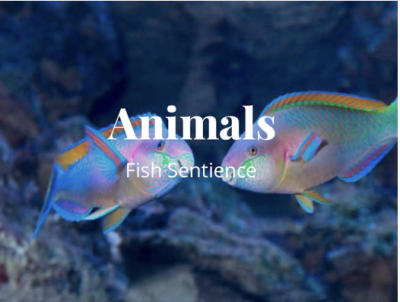Animals - Fish Sentience

In the more affluent countries of the world and among many health enthusiasts’ fish and other seafoods have been touted as healthy alternatives to mammal meat or poultry and even as a health food. Self-described pescatarian diets have become the rage. They claim that it is the healthiest diet, nothing could be further from the truth. The need for animal sourced protein has been disproven by thousands of scientific studies. This is in addition to the fact that fish are one of the most polluted foods available.
As with many of our planets environmental features we have tended to view the oceans of the world and the life within them through the lens of our economy. We have placed a price on the life within the sea and the minerals beneath it but have not considered the cost. The cost is the wellbeing of future generations. We have also ignored the damage we do to a whole world of sentient life we do not understand and yet feel glad to destroy.
Life within the oceans and rivers of the world are a mysterious and alien realm to humans. Our view of fish is even more distorted than our attitude toward other land animals. Even though science has demonstrated the unique sentience of sea creatures it seems difficult to respect the fact that their life has value to them.
Fish and sea mammals are social creatures. They recognize each other and communicate through sound. The creatures of the sea constantly hold communications with their kind. We are aware of the songs of the whales, but the oceans are a symphony of sound. Creatures speaking in a variety of voices with their own kind.
Fish can remember past social interactions that they’ve had with other fish, and they show affection by rubbing against each other. They display curiosity and are interested in new objects introduced in their environment. They have very complex nervous system and react to painful stimuli the way all animals do—their breathing rate increases, their muscles contract, and they try to escape danger and will fight to the death. Those who fish for sport look forward to these struggles it is the thrill of the catch. The battle between life and death. Once caught, fish die of asphyxiation. It is the equivalent of a human drowning.
It is estimated that over 2 trillion fish are killed by humans every year. This does not factor in the billions of sea animals that are killed in the fishing industry but not economically preferred. An increasing number of fish are raised in fish farms, the aquatic version of factory farms. On these farms, fish spend their whole lives (up to two years) confined in tightly packed spaces. The water can become toxic, and filled with antibiotics, pesticides, parasites, and faeces. A 2-acre fish farm can produce as much waste as a town of 10,000 people.
The results of commercial fishing produce the similar environmental damage as those created by raising land animals. The balance of life within the seas are being disturbed by barbaric methods of fishing with drag nets that scour the sea bottom and indiscriminately pull up all life. Concentration on specific popular fish such as salmon, cod and tuna create an imbalance in the oceans ecosystems that lead to reduction in oxygen producing sea plants. This “trophic cascade” is reducing the ability of the oceans to produce the two thirds of the oxygen needed by the earth.
The solution is simply to stop eating animals. A life based on death is not a healthy life. See how easy it is? Check out our eBook, The Human Ecology Diet, on our website.

